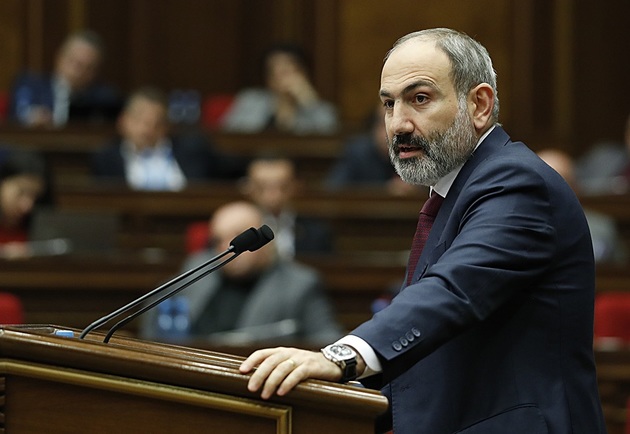The long-awaited first session of the renewed Armenian parliament was immediately disrupted. Thus ended the first meeting of irreconcilable political opponents within the walls of a state institution. Prior to that, supporters and opponents of the "revolutionary" government of Nikol Pashinyan clashed with each other only during political actions on the streets of Armenian cities.
The work of the parliament began with a provocation: the opposition blocs "Armenia" and "I have the honor" nominated the former heads of the municipalities of Meghri and Sisian Mkhitar Zakaryan and Artur Sargsyan, who are under investigation, for the post of deputy speaker of the parliament. Both of those under investigation are active supporters of the party of ex-President of Armenia Robert Kocharian, who was defeated in the early elections in June this year. Zakaryan and Sargsyan are deputies, and therefore can hope for parliamentary immunity if their party members are able to secure the release of both politicians.
The opposition's actions looked like a political manipulation doomed to failure, since the re-elected Prime Minister Nikol Pashinyan personally supervises the initiation of criminal cases against deputies and other politicians, who is not used to retreating in an effort to put as many opponents as possible behind bars. The current investigation into Zakaryan and Sargsyan, who are accused of exceeding their official powers, is quite an ordinary event in post-revolutionary Armenia, and therefore the current activity of the parliamentary opposition is aimed exclusively at supporters of the Armenia and I have the honor blocs, so that they do not rush to turn away from the nationalists who passed into parliament.
The Karabakh separatists and their supporters who entered parliament intend to boycott the work of the National Assembly, and not cooperate for the good of society. This is largely due to the fact that an atmosphere of healthy political competition has not formed in Armenia over the past thirty years. Armenian politicians are not used to working together, preferring to create the illusion of political pluralism, behind which the hegemony of one political force is hidden. It is difficult to imagine what the political forces can agree on, which preferred to start the first session of the renewed parliament by leaving the conference room without waiting for the end of the working day. Therefore, the release of two deputies with a dubious reputation for the nationalist opposition is a much more significant agenda than the discussion of the current internal political problems of Armenia.
Nikol Pashinyan, who officially took office as prime minister, refrained from making any comments regarding the political demarche of his opponents. He tries to ignore the policy of the "Armenia" and "I have the honor" blocs, consistently forming an alternative belt of the Armenian opposition, which corresponds to the canons of Armenian politics - consistency, controllability. A week and a half before the parliamentary meeting the day before, the prime minister held the first meeting with the participation of extra-parliamentary parties. The political culture of post-Soviet Armenia has formed a simple rule: if you cannot subjugate the parliamentary opposition, create your own. Pashinyan follows this path, preferring to give the deputies of the nationalist blocs the right to destroy their own reputation and appear in the eyes of the public as an embittered minority, unable to do anything other than disrupt parliamentary sessions.
But despite the clear antagonism between the parliamentary majority and the opposition, parliament is unlikely to become an arena for a showdown. Of course, pathetic speeches will be heard in the conference room of the National, which may alternate with curses against the dominant Civil Contract faction, but they will not affect real life in the country. Since neither Pashinyan nor his opponents intend to work with each other, a real political struggle will unfold on the streets. To do this, Pashinyan and his faction need to remind from time to time of the past of his political opponents from among the former political elite, for whom a return to big politics became possible as a result of the revanchist sentiments spread throughout the country after the crushing defeat of Armenia in Karabakh.






